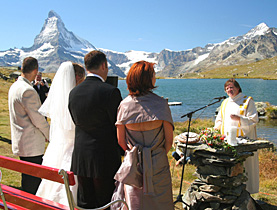Love may lose out under marriage law

A Geneva politician warns that a motion going through parliament that would make marriage with non-Swiss residents illegal in Switzerland could do more harm than good.
The Swiss People’s Party amendment to the Foreign Nationals Law would end the right to marry for asylum seekers and illegal residents in Switzerland. It aims to curb the number of marriages of convenience used by people trying to get around the law to stay in the country.
Having gained the approval of the House of Representatives in March it is due before the Senate “soon”, the Federal Migration Office confirmed.
Antonio Hodgers of the Green Party says it infringes on people’s rights.
“I don’t think you can criminalise marriage. Everyone is free to choose why they want to marry and that’s why it is very delicate when you try to penalise marriages of convenience, you end up criminalising people’s motives for marriage,” he told swissinfo.ch.
“Some marry for love, some marry for money, some marry for family. I don’t think the authorities should judge why people marry. There is only one circumstance with which I agree [with the motion] – people who clearly receive money to get married to someone so it can be used to their advantage, notably for a residence permit.”
Growing awareness
Last week, criminal proceedings were launched against eight people in Zurich for entering marriages of convenience to gain a Swiss visa, which cantonal officials say is a growing trend.
Canton Zurich has the highest amount of legal foreigners in Switzerland with registered residence permits. It investigated 3,500 cases of suspected “green card” marriages in 2007, of which 500 registered unions were found to be shams.
“We understand that people want to stay in Switzerland and this is one way of getting around the law. They get married if they cannot stay,” said Bettina Dangel of the Zurich canton migration office.
“We are noticing that this situation is tending to increase. The reason could be on the one hand the growing number of foreign people and on the other a growing awareness among the authorities concerned. This results in more messages that reach us and in us carrying out checks more often.”
She says figures appeared to be in line with those of 2008 and there were an estimated 1,000 cases annually in Switzerland, although “the real figure could be far higher”.
Informing police
The probe by the Zurich migration office is one of the first criminal proceedings launched since the introduction of the new Foreign Nationals Law in 2008.
Under the draft amendment to be reviewed by the Senate, before obtaining the go-ahead for marriage, foreign fiancés would be required to prove they are legally resident in Switzerland and produce a residence permit or visa.
Registrars would be obliged to inform the police about all marriage candidates who are illegal residents. The draft would also give civil registry offices and the authorities access to a central database of information about migrants.
Justice Minister Eveline Widmer-Schlumpf said the reform would “harmonise practices between the cantons”.
Vigilant
Hodgers warned it would impact not only on foreign nationals but also on Swiss who want to marry a non-Swiss resident.
“We are stopping people from falling in love with whoever they wish. Before you fall in love you have to ask to see their papers to be sure that all will end well. It is not just an attack towards foreigners, it is an attack on the Swiss.”
He adds that he does not expect the Senate to vote differently to the House of Representatives but urges vigilance if the motion is enforced.
“I think it will be the role of the media and associations – from the moment that the law comes into force – to show a little the absurdity of [cases where] people want to marry but cannot if one of them does not have the residence permit.”
Jessica Dacey, swissinfo.ch
Asylum and foreigners laws have been progressively tightened since the middle of the 1980s.
The Senate approved the revised Foreign Nationals Law in January 2008. It covers three main areas:
1. Admittance: limitations apply to all non-EU states, with only qualified workers and their families permitted entry.
2. Integration: to improve the situation of legally and permanent resident foreign nationals and remove difficulties affecting the subsequent immigration of their families.
3. Offences: stricter punishment for crime and abuse of the law.
It also made it harder for those with temporary residence permits to bring family members into the country.
The law also envisaged prison sentences for those who force their children or relatives into arranged marriages.
If a cantonal migration office suspects a marriage of convenience they bring in the police. Police will visit the couple at home and will ask them questions about the marriage separately such as the date, guests, location.
Usual indicators are:
– the marriage is connected to a person being told to leave the country, eg a negative asylum decision or an extension request to stay on is denied.
– the couple only knew each other for a short time before getting married.
– there is a large age difference between spouses.
– where the Swiss national spouse has an alcohol or drug addiction.
Cases are usually closed based on circumstantial information. Cases are hard to detect in the run-up to a marriage and are mostly confirmed in retrospect, for example, when the authorities learn that the spouses have not lived together.
Confirmed cases are punishable with a custodial sentence or a fine of up to SFr20,000 ($18,360).

In compliance with the JTI standards
More: SWI swissinfo.ch certified by the Journalism Trust Initiative





You can find an overview of ongoing debates with our journalists here. Please join us!
If you want to start a conversation about a topic raised in this article or want to report factual errors, email us at english@swissinfo.ch.